GRE作文北美范文实践是成功的唯一途径
- 格式:docx
- 大小:16.23 KB
- 文档页数:2
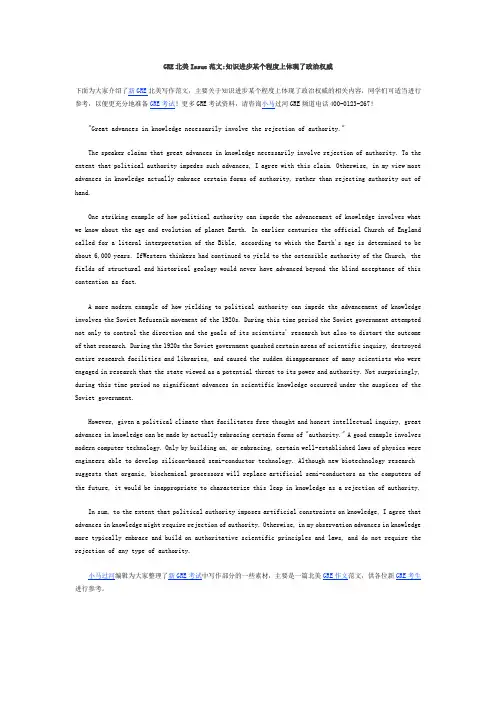
GRE北美Issue范文:知识进步某个程度上体现了政治权威下面为大家介绍了新GRE北美写作范文,主要关于知识进步某个程度上体现了政治权威的相关内容,同学们可适当进行参考,以便更充分地准备GRE考试!更多GRE考试资料,请咨询小马过河GRE频道电话400-0123-267!"Great advances in knowledge necessarily involve the rejection of authority."The speaker claims that great advances in knowledge necessarily involve rejection of authority. To the extent that political authority impedes such advances, I agree with this claim. Otherwise, in my view most advances in knowledge actually embrace certain forms of authority, rather than rejecting authority out of hand.One striking example of how political authority can impede the advancement of knowledge involves what we know about the age and evolution of planet Earth. In earlier centuries the official Church of England called for a literal interpretation of the Bible, according to which the Earth's age is determined to be about 6,000 years. IfWestern thinkers had continued to yield to the ostensible authority of the Church, the fields of structural and historical geology would never have advanced beyond the blind acceptance of this contention as fact.A more modern example of how yielding to political authority can impede the advancement of knowledge involves the Soviet Refusenik movement of the 1920s. During this time period the Soviet government attempted not only to control the direction and the goals of its scientists' research but also to distort the outcome of that research. During the 1920s the Soviet government quashed certain areas of scientific inquiry, destroyed entire research facilities and libraries, and caused the sudden disappearance of many scientists who were engaged in research that the state viewed as a potential threat to its power and authority. Not surprisingly, during this time period no significant advances in scientific knowledge occurred under the auspices of the Soviet government.However, given a political climate that facilitates free thought and honest intellectual inquiry, great advances in knowledge can be made by actually embracing certain forms of "authority." A good example involves modern computer technology. Only by building on, or embracing, certain well-established laws of physics were engineers able to develop silicon-based semi-conductor technology. Although new biotechnology research suggests that organic, biochemical processors will replace artificial semi-conductors as the computers of the future, it would be inappropriate to characterize this leap in knowledge as a rejection of authority.In sum, to the extent that political authority imposes artificial constraints on knowledge, I agree that advances in knowledge might require rejection of authority. Otherwise, in my observation advances in knowledge more typically embrace and build on authoritative scientific principles and laws, and do not require the rejection of any type of authority.小马过河编辑为大家整理了新GRE考试中写作部分的一些素材,主要是一篇北美GRE作文范文,供各位新GRE考生进行参考。
![GRE北美满分作文赏析[1]](https://uimg.taocdn.com/8f086f3cfe00bed5b9f3f90f76c66137ee064fa8.webp)
GRE北美满分作文赏析[1]2016年GRE北美满分作文范文赏析[1]导语:下面是小编整理的GRE北美满分作文,供您参考学习,希望能带给您帮助。
The following appeared as part of an article in a daily newspaper:"Most companies would agree that as the risk of physical injury occurring on the job increases, the wages paid to employees should also increase. Hence it makes financial sense for employers to make the workplace safer: they could thus reduce their payroll expenses and save money."Discuss how well reasoned you find this argument. In your discussion be sure to analyze the line of reasoning and the use of evidence in the argument. For example, you may need to consider what questionable assumptions underlie the thinking and what alternative explanations or counterexamples might weaken the conclusion. You can also discuss what sort of evidence would strengthen or refute the argument, what changes in the argument would make it more logically sound, and what, if anything, would help you better evaluate its conclusion.GRE写作范文:GRE首段This argument states that it makes financial sense for employers to make the workplace safer because by making the workplace safer then lower wages could be paid to employees. This conclusion is based on the premise that as the list of physical injury increases, the wages paid to employees should also increase. However, there are severalassumptions that may not necessarily apply to this argument. For example, the costs associated with making the workplace safe must outweigh the increased payroll expenses due to hazardous conditions. Also, one must look at the plausability of improving the work environment. And finally, because most companies agree that as the risk of injury increases so will wages doesn't necessarily mean that the all companies which have hazardous work environments agree.GRE中间段1The first issue to be addressed is whether increased labor costs justify large capital expenditures to improve the work environment. Clearly one could argue that if making the workplace safe would cost an exorbitant amount of money in comparison to leaving the workplace as is and paying slightly increased wages than it would not make sense to improve the work environment. For example, if making the workplace safe would cost $100 million versus additional payroll expenses of only $5,000 per year, it would make financial sense to simply pay the increased wages. No business or business owner with any sense would pay all that extra money just to save a couple dollars and improve employee health and relations. To consider this, a cost benefit analysis must be made. I also feel that although a cost benefit analysis should be the determining factor with regard to these decisions making financial sense, it may not be the determining factor with regard to making social, moral and ethical sense.GRE中间段2This argument also relies on the idea that companies solely use financial sense in analysing improving the work environment. This is not the case. Companies look at otherconsiderations such as the negative social ramifications of high on-job injuries. For example, Toyota spends large amounts of money improving its environment because while its goal is to be profitable, it also prides itself on high employee morale and an almost perfectly safe work environment. However, Toyota finds that it can do both, as by improving employee health and employee relations they are guaranteed a more motivated staff, and hence a more efficient staff; this guarantees more money for the business as well as more safety for the employees.GRE中间段3Finally one must understand that not all work environments can be made safer. For example, in the case of coal mining, a company only has limited ways of making the work environment safe. While companies may be able to ensure some safety precautions, they may not be able to provide all the safety measures necessary. In other words, a mining company has limited ability to control the air quality within a coal mine and therefore it cannot control the risk of employees getting blacklung. In other words, regardless of the intent of the company, some jobs are simply dangerous in nature.GRE末端In conclusion, while at first it may seem to make financial sense to improve the safety of the work environment sometimes it truly does not make financial sense. Furthermore, financial sense may not be the only issue a company faces. Other types of analyses must be made such as the social ramifications of an unsafe work environment and the overall ability of a company to improve that environment(i.e。
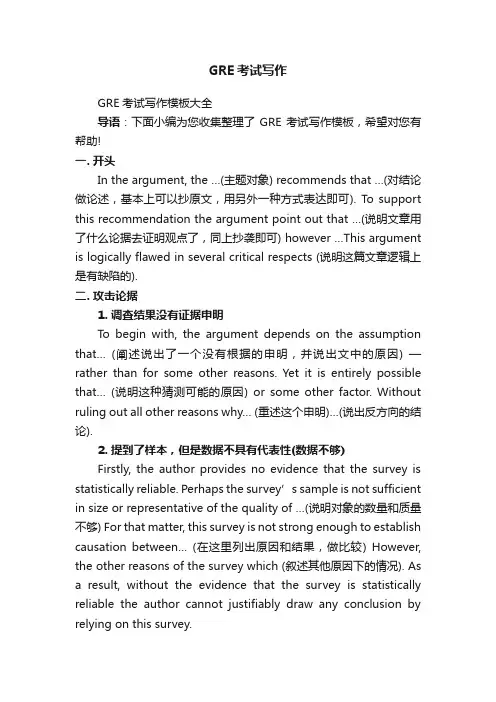
GRE考试写作GRE考试写作模板大全导语:下面小编为您收集整理了GRE考试写作模板,希望对您有帮助!一. 开头In the argument, the …(主题对象) recommends that …(对结论做论述,基本上可以抄原文,用另外一种方式表达即可). To support this recommendation the argument point out that …(说明文章用了什么论据去证明观点了,同上抄袭即可) however …This argument is logically flawed in several critical respects (说明这篇文章逻辑上是有缺陷的).二. 攻击论据1. 调查结果没有证据申明To begin with, the argument depends on the assumption that… (阐述说出了一个没有根据的申明,并说出文中的原因) —rather than for some other reasons. Yet it is entirely possible that… (说明这种猜测可能的原因) or some other factor. Without ruling out all other reasons why… (重述这个申明)…(说出反方向的结论).2. 提到了样本,但是数据不具有代表性(数据不够)Firstly, the author provides no evidence that the survey is statistically reliabl e. Perhaps the survey’s sample is not sufficient in size or representative of the quality of …(说明对象的数量和质量不够) For that matter, this survey is not strong enough to establish causation between… (在这里列出原因和结果,做比较) However, the other reasons of the survey which (叙述其他原因下的情况). As a result, without the evidence that the survey is statistically reliable the author cannot justifiably draw any conclusion by relying on this survey.3. 猜测,但是没有证据Thirdly, the argument assumes that… (阐述文中的猜测) However, the letter provides no evidence to substantiate this assumption. In fact, the letter suggests that this might be the case. By admitting that …, the letter implies that …说明影响他们happy的因素还有其他的方面,不光是研究中所列举三. 攻击论证过程1. 时间上的错误类比To begin with,…(陈述某个数据) may not a reliable date of that rate would be now(和现在相比较是不可信的). Perhaps the… (反例), For that matter, perhaps …(说出反例的情况下会导致何种结果). In short, without ruling out other possible reasons for …(假设说出针对反例应该怎么做)the memo’s author cannot convince me on the basis of …(说出应该有的结论)2.错误的因果关系3. 两个事实错误的类比Even if…(让步,即使某个条件成立) the argument unfairly assumes that…(说明错误的`类比的情况). It is entirely possible that the …(比较对象) own different situations. Perhaps …(具体说出反例) Without accounting for such differences between the two places is unreliable.4. 错误的推论Even if …(让步,即使某个条件成立)the argument relied on the future assumption that …(说出要让步的是事实). Yet the only evidence the argument offer to substantiate this assumption (说出文中的根据). Perhaps …(说出有可能出现的其他情况导致这个事实)if so, (说出不一样的结果,与上面事实相矛盾). Or…(其他的情况) In short, without more infor mation about…(对上面的可能情况总结) were established it is impossible to assess …(回到上面的结论). 四. 结论的攻击说明结论不完美,可以有其他的方法Finally, the argument fails to consider …(有更好的办法实现目标). Perhaps by…(办法一), or by (办法二), (对目标进行展望) In short, without weighing the suggestion against alternatives, it is unconvincing that (说明提供的方案不好).赢利Finally, even if the families support to build the new seafood restaurant, the restaurant would not necessarily be profitable as a result. Profitability is a function of both revenue and expense. Thus, it is quite possible that the restaurant’s costs of obtaining high-quality and healthy seafood or of new promoting restaurant might render it unprofitable despite its popularity. Without weighing revenue against expenses the argument’s conclusion is premature at best.同时叙述两个错误的论据The memo also makes two hasty assumptions about …(说明两个猜想相关的内容). One such assumption is that …(第一个猜想的情况说明). It is entirely possible that …(反例). Another assumption is that(另外一个错误的猜想) Common sense informs me that (反例) Furthermore, the d ifference in the two firms’ overall placement time last year does not necessarily indicate that Delany would be the better choice to serve XYZ’s laid-off employees. These employees might have particular skills or needs that are not representative of the tw o firm’s clients in general. Besides, one year’s placement statistics hardly sufficient to draw any firm conclusions.五. 结尾段In sum, the argument seems logical, but is based on nothing more than pure speculation and perhaps wishful thinking, yet lack of some warranted investigation. To strength it, the authorneeds to evaluate all possible alternatives and provide detail and comprehensive evidence before jumping to the conclusion that...。
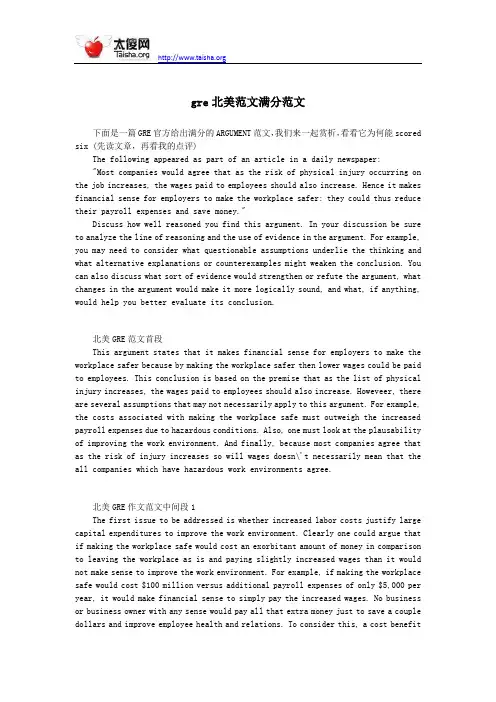
gre北美范文满分范文下面是一篇GRE官方给出满分的ARGUMENT范文,我们来一起赏析,看看它为何能scored six (先读文章,再看我的点评)The following appeared as part of an article in a daily newspaper:"Most companies would agree that as the risk of physical injury occurring on the job increases, the wages paid to employees should also increase. Hence it makes financial sense for employers to make the workplace safer: they could thus reduce their payroll expenses and save money."Discuss how well reasoned you find this argument. In your discussion be sure to analyze the line of reasoning and the use of evidence in the argument. For example, you may need to consider what questionable assumptions underlie the thinking and what alternative explanations or counterexamples might weaken the conclusion. You can also discuss what sort of evidence would strengthen or refute the argument, what changes in the argument would make it more logically sound, and what, if anything, would help you better evaluate its conclusion.北美GRE范文首段This argument states that it makes financial sense for employers to make the workplace safer because by making the workplace safer then lower wages could be paid to employees. This conclusion is based on the premise that as the list of physical injury increases, the wages paid to employees should also increase. Howeveer, there are several assumptions that may not necessarily apply to this argument. For example, the costs associated with making the workplace safe must outweigh the increased payroll expenses due to hazardous conditions. Also, one must look at the plausability of improving the work environment. And finally, because most companies agree that as the risk of injury increases so will wages doesn\'t necessarily mean that the all companies which have hazardous work environments agree.北美GRE作文范文中间段1The first issue to be addressed is whether increased labor costs justify large capital expenditures to improve the work environment. Clearly one could argue that if making the workplace safe would cost an exorbitant amount of money in comparison to leaving the workplace as is and paying slightly increased wages than it would not make sense to improve the work environment. For example, if making the workplace safe would cost $100 million versus additional payroll expenses of only $5,000 per year, it would make financial sense to simply pay the increased wages. No business or business owner with any sense would pay all that extra money just to save a couple dollars and improve employee health and relations. To consider this, a cost benefitanalysis must be made. I also feel that although a cost benefit analysis should be the determining factor with regard to these decisions making financial sense, it may not be the determining factor with regard to making social, moral and ethical sense.北美GRE范文中间段2This argument also relies on the idea that companies solely use financial sense in analysing improving the work environment. This is not the case. Companies look at other considerations such as the negative social ramifications of high on-job injuries. For example, Toyota spends large amounts of money improving its environment because while its goal is to be profitable, it also prides itself on high employee morale and an almost perfectly safe work environment. However, Toyota finds that it can do both, as by improving employee health and employee relations they are guaranteed a more motivated staff, and hence a more efficient staff; this guarantees more money for the business as well as more safety for the employees.北美GRE写作范文中间段3Finally one must understand that not all work environments can be made safer. For example, in the case of coal mining, a company only has limited ways of making the work environment safe. While companies may be able to ensure some safety precautions, they may not be able to provide all the safety measures necessary. In other words, a mining company has limited ability to control the air quality within a coal mine and therefore it cannot control the risk of employees getting blacklung. In other words, regardless of the intent of the company, some jobs are simply dangerous in nature.北美GRE范文末端In conclusion, while at first it may seem to make financial sense to improve the safety of the work environment sometimes it truly does not make financial sense. Furthermore, financial sense may not be the only issue a company faces. Other types of analyses must be made such as the social ramifications of an unsafe work environment and the overall ability of a company to improve that environment (i.e。
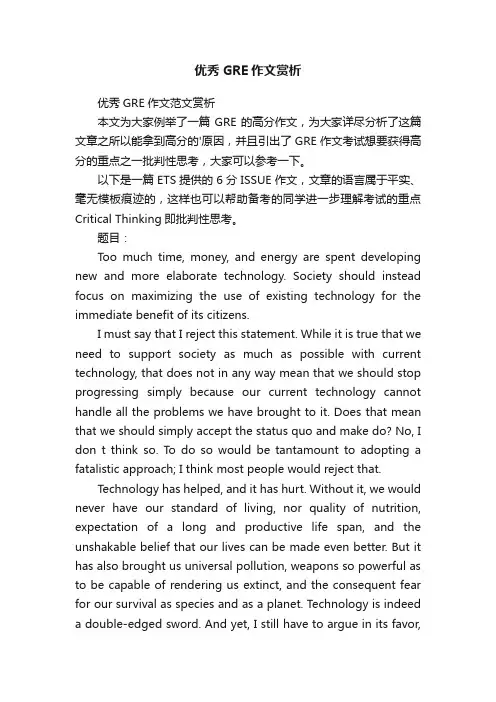
优秀GRE作文赏析优秀GRE作文范文赏析本文为大家例举了一篇GRE的高分作文,为大家详尽分析了这篇文章之所以能拿到高分的'原因,并且引出了GRE作文考试想要获得高分的重点之一批判性思考,大家可以参考一下。
以下是一篇ETS提供的6分ISSUE作文,文章的语言属于平实、毫无模板痕迹的,这样也可以帮助备考的同学进一步理解考试的重点Critical Thinking即批判性思考。
题目:Too much time, money, and energy are spent developing new and more elaborate technology. Society should instead focus on maximizing the use of existing technology for the immediate benefit of its citizens.I must say that I reject this statement. While it is true that we need to support society as much as possible with current technology, that does not in any way mean that we should stop progressing simply because our current technology cannot handle all the problems we have brought to it. Does that mean that we should simply accept the status quo and make do? No, I don t think so. T o do so would be tantamount to adopting a fatalistic approach; I think most people would reject that.Technology has helped, and it has hurt. Without it, we would never have our standard of living, nor quality of nutrition, expectation of a long and productive life span, and the unshakable belief that our lives can be made even better. But it has also brought us universal pollution, weapons so powerful as to be capable of rendering us extinct, and the consequent fear for our survival as species and as a planet. Technology is indeed a double-edged sword. And yet, I still have to argue in its favor,because without it, we have no hope.。
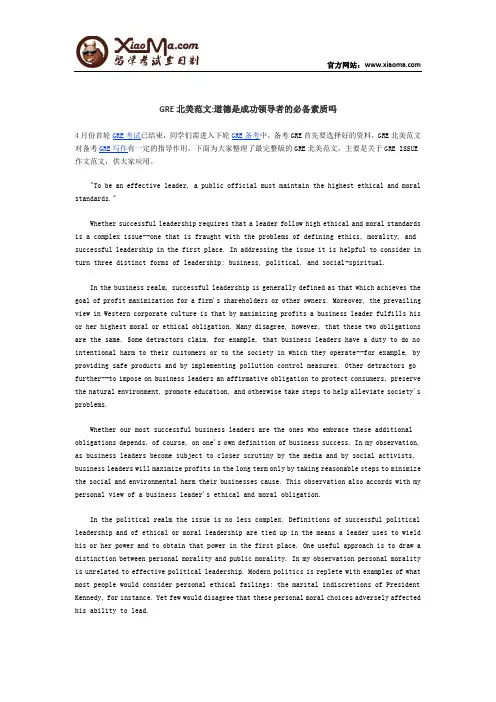
GRE北美范文:道德是成功领导者的必备素质吗4月份首轮GRE考试已结束,同学们需进入下轮GRE备考中,备考GRE首先要选择好的资料,GRE北美范文对备考GRE写作有一定的指导作用,下面为大家整理了最完整版的GRE北美范文,主要是关于GRE ISSUE 作文范文,供大家应用。
"To be an effective leader, a public official must maintain the highest ethical and moral standards."Whether successful leadership requires that a leader follow high ethical and moral standards is a complex issue--one that is fraught with the problems of defining ethics, morality, and successful leadership in the first place. In addressing the issue it is helpful to consider in turn three distinct forms of leadership: business, political, and social-spiritual.In the business realm, successful leadership is generally defined as that which achieves the goal of profit maximization for a firm's shareholders or other owners. Moreover, the prevailing view in Western corporate culture is that by maximizing profits a business leader fulfills his or her highest moral or ethical obligation. Many disagree, however, that these two obligations are the same. Some detractors claim, for example, that business leaders have a duty to do no intentional harm to their customers or to the society in which they operate--for example, by providing safe products and by implementing pollution control measures. Other detractors go further--to impose on business leaders an affirmative obligation to protect consumers, preserve the natural environment, promote education, and otherwise take steps to help alleviate society's problems.Whether our most successful business leaders are the ones who embrace these additional obligations depends, of course, on one's own definition of business success. In my observation, as business leaders become subject to closer scrutiny by the media and by social activists, business leaders will maximize profits in the long term only by taking reasonable steps to minimize the social and environmental harm their businesses cause. This observation also accords with my personal view of a business leader's ethical and moral obligation.In the political realm the issue is no less complex. Definitions of successful political leadership and of ethical or moral leadership are tied up in the means a leader uses to wield his or her power and to obtain that power in the first place. One useful approach is to draw a distinction between personal morality and public morality. In my observation personal morality is unrelated to effective political leadership. Modern politics is replete with examples of what most people would consider personal ethical failings: the marital indiscretions of President Kennedy, for instance. Yet few would disagree that these personal moral choices adversely affected his ability to lead.In contrast, pubhc morality and successful leadership are more closely connected. Consider the many leaders, such as Stalin and Hitler, whom most people would agree were egregious violators of public morality. Ultimately such leaders forfeit their leadership as a result of the immoral means by which they obtained or wielded their power. Or consider less egregious examples such as President Nixon, whose contempt for the very legal system that afforded him his leadership led to his forfeiture of it. It seems that in the short term unethical publicbehavior might serve a political leader's interest in preserving his or her power; yet in the long term such behavior invariably results in that leader's down- fall that is, in failure.One must also consider a third type of leadership: social-spiritual. Consider notable figures such as Gandhi and Martin Luther King, whom few would disagree were eminently successful in leading others to practice the high ethical and moral standards which they advocated. However, I would be hard-pressed to name one successful social or spiritual leader whose leadership was predicated on the advocacy of patently unethical or immoral behavior. The reason for this is simple: high standards for one's own public morality are prerequisites for successful social-spiritual leadership.In sum, history informs us that effective political and social-spiritual leadership requires adherence to high standards of public morality. However, when it comes to business leadership the relationship is less clear; successful business leaders must strike a balance between achieving profit maximization and fulfilling their broader obligation to the society, which comes with the burden of such leadership.。
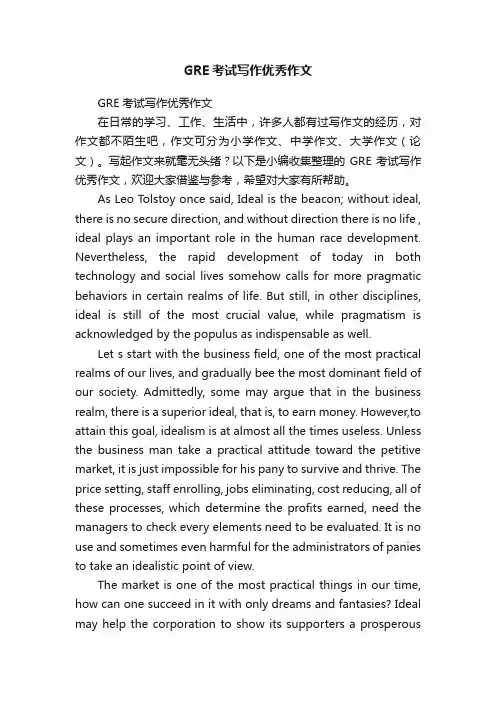
GRE考试写作优秀作文GRE考试写作优秀作文在日常的学习、工作、生活中,许多人都有过写作文的经历,对作文都不陌生吧,作文可分为小学作文、中学作文、大学作文(论文)。
写起作文来就毫无头绪?以下是小编收集整理的GRE考试写作优秀作文,欢迎大家借鉴与参考,希望对大家有所帮助。
As Leo T olstoy once said, Ideal is the beacon; without ideal, there is no secure direction, and without direction there is no life , ideal plays an important role in the human race development. Nevertheless, the rapid development of today in both technology and social lives somehow calls for more pragmatic behaviors in certain realms of life. But still, in other disciplines, ideal is still of the most crucial value, while pragmatism is acknowledged by the populus as indispensable as well.Let s start with the business field, one of the most practical realms of our lives, and gradually bee the most dominant field of our society. Admittedly, some may argue that in the business realm, there is a superior ideal, that is, to earn money. However,to attain this goal, idealism is at almost all the times useless. Unless the business man take a practical attitude toward the petitive market, it is just impossible for his pany to survive and thrive. The price setting, staff enrolling, jobs eliminating, cost reducing, all of these processes, which determine the profits earned, need the managers to check every elements need to be evaluated. It is no use and sometimes even harmful for the administrators of panies to take an idealistic point of view.The market is one of the most practical things in our time, how can one succeed in it with only dreams and fantasies? Ideal may help the corporation to show its supporters a prosperousfuture, but it won t help the pany to stand long in the brutal economy.。

How to Aohieve Success(如何取得成功)1.⼈们对成功的理解;2.我对成功的看法;3.如何取得成功。
[写作导航]第⼀段可写不同的⼈对于成功持不同的观点,有⼈认为能赚⼤钱就是成功,有⼈认为⾼官显赫⽅为成功,还有⼈认为能成为的教授就是成功。
然后写“我”的看法,即不论⼲什么,只要能给国家发展做出贡献、为他⼈带来幸福就是成功。
第三段写取得成功的⽅法,即成功不但要有明确的⽬标、有坚持不懈的努⼒、有永不动摇的决⼼,更要有虚⼼向他⼈学习、注重集体智慧、发扬团结互助的精神等。
[范⽂]Different people have different views on success. Some hold that making a great deal of money means success. Others argue that holding an important post in the government means success. Still others believe that having a high academic title at a famous university or a research institute means success.In my opinion, success means brilliant achievement in our work. In other words, no matter what we do, making outstanding contributions to the development of our country and bringing help and happiness to others is success.To achieve success, we should, first of all, have a clear long-term goal in our life. Besides, we should have short term goals in different periods of life. As we know, it is these short term goals that make our long-term goal possible. Second, we should be both perseverant and hardworking. Whatever we do, there are always two possibilities: success and failure. We should never lose heart when we come across difficulties or when we are confronted with failure. Instead, we should learn from our experience, build up our confidence and work even harder and smarter towards our purpose. Third, we should follow the examples of those who are successful and learn from them. Finally, we should try to get along well with our classmates and colleagues. We should care for each other and help each other in our study, our work and our life, because team work is of great importance in the realization of our dream.If we can follow these principles, we will certainly achieve remarkable success in our life。
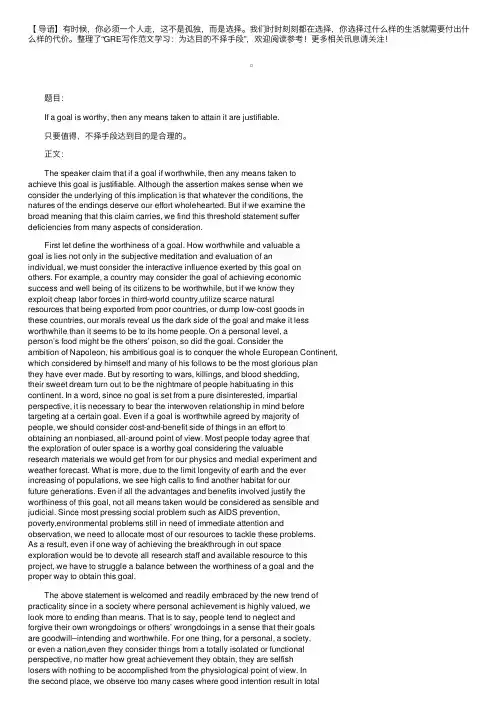
【导语】有时候,你必须⼀个⼈⾛,这不是孤独,⽽是选择。
我们时时刻刻都在选择,你选择过什么样的⽣活就需要付出什么样的代价。
整理了“GRE写作范⽂学习:为达⽬的不择⼿段”,欢迎阅读参考!更多相关讯息请关注! 题⽬: If a goal is worthy, then any means taken to attain it are justifiable. 只要值得,不择⼿段达到⽬的是合理的。
正⽂: The speaker claim that if a goal if worthwhile, then any means taken toachieve this goal is justifiable. Although the assertion makes sense when weconsider the underlying of this implication is that whatever the conditions, thenatures of the endings deserve our effort wholehearted. But if we examine thebroad meaning that this claim carries, we find this threshold statement sufferdeficiencies from many aspects of consideration. First let define the worthiness of a goal. How worthwhile and valuable agoal is lies not only in the subjective meditation and evaluation of anindividual, we must consider the interactive influence exerted by this goal onothers. For example, a country may consider the goal of achieving economicsuccess and well being of its citizens to be worthwhile, but if we know theyexploit cheap labor forces in third-world country,utilize scarce naturalresources that being exported from poor countries, or dump low-cost goods inthese countries, our morals reveal us the dark side of the goal and make it lessworthwhile than it seems to be to its home people. On a personal level, aperson’s food might be the others’ poison, so did the goal. Consider theambition of Napoleon, his ambitious goal is to conquer the whole European Continent,which considered by himself and many of his follows to be the most glorious planthey have ever made. But by resorting to wars, killings, and blood shedding,their sweet dream turn out to be the nightmare of people habituating in thiscontinent. In a word, since no goal is set from a pure disinterested, impartialperspective, it is necessary to bear the interwoven relationship in mind beforetargeting at a certain goal. Even if a goal is worthwhile agreed by majority ofpeople, we should consider cost-and-benefit side of things in an effort toobtaining an nonbiased, all-around point of view. Most people today agree thatthe exploration of outer space is a worthy goal considering the valuableresearch materials we would get from for our physics and medial experiment andweather forecast. What is more, due to the limit longevity of earth and the everincreasing of populations, we see high calls to find another habitat for ourfuture generations. Even if all the advantages and benefits involved justify theworthiness of this goal, not all means taken would be considered as sensible andjudicial. Since most pressing social problem such as AIDS prevention,poverty,environmental problems still in need of immediate attention andobservation, we need to allocate most of our resources to tackle these problems.As a result, even if one way of achieving the breakthrough in out spaceexploration would be to devote all research staff and available resource to thisproject, we have to struggle a balance between the worthiness of a goal and theproper way to obtain this goal. The above statement is welcomed and readily embraced by the new trend ofpracticality since in a society where personal achievement is highly valued, welook more to ending than means. That is to say, people tend to neglect andforgive their own wrongdoings or others’ wrongdoings in a sense that their goalsare goodwill–intending and worthwhile. For one thing, for a personal, a society,or even a nation,even they consider things from a totally isolated or functionalperspective, no matter how great achievement they obtain, they are selfishlosers with nothing to be accomplished from the physiological point of view. Inthe second place, we observe too many cases where good intention result in totalchaos derive not from the dirty tricks they construe but out of the impropermeans they take. Since the founding of People’s Republic of China, under the leadership of Chairman Mao, China has undergone a reform in the area of economy, which is to implement plannedeconomy. Mao’s intention is good, and his goal is to realize communalisms inthis new country to short its economic gap with the western country in theshortest as possible. But without considering the properness of this means fromthe economic and social point of view, he threw china into years of economicregression and stillness. Ideas went contrary to our wills and intentionsoccasionally and thus make the consideration and full analyzes of the means toobtaining goals even pressing. To sum up, I am against the speaker’s assertion since he neglects oneimportant aspect of how to evaluate goals. To devote to a worth goal isjustifiable and the effort instilled in this process deserve our accolade sinceit is always this power that push the society forward. But by neglecting themeans of how to obtain these goals, we put ourselves in an embarrassing place offunctionalists and opportunists. As a result, it is highly resulted to look fromdifferent perspectives to figure our where the true value of a goal lies and howto achieve it.。

英语考试作文GRE写作优秀素材集锦教你写出亮眼作文(一)众所周知,优秀的GRE写作素材是我们取得成功的关键因素,也是我们备考GRE写作最重要的步骤。
因此,我们GRE作文栏目为大家整理了部分优秀的GRE写作素材,希望对大家的GRE考试有所帮助!GRE写作素材英文谚语如下,大家可以作为参考准备GRE 考试。
1.Experience is the best teacher.经验是最好的教师。
2.Experience is the father of wisdom and memory the mother.经验是知识之父,记忆是知识之母。
3.Dexterity comes by experience.熟练来自经验。
4.Practice makes perfect.熟能生巧。
5.Experience keeps a dear school,but fools learn in no other.经验学校学费高,愚人旁处学不到。
6.Experience without learning is better than learning without experience.有经验而无学问,胜于有学问而无经验。
7.Wit once bought is worth twice taught.由经验而得的智慧,胜于学习而得的智慧;一次亲身的体会,胜过两次的教师教导。
8.Seeing is believing.百闻不如一见。
以上就是我们GRE作文栏目为各位考生整理的关于GRE写作优秀素材集锦介绍,希望考生积极做好备考工作,及时调整好状态,争取在GRE写作考试中取得理想的成绩!。
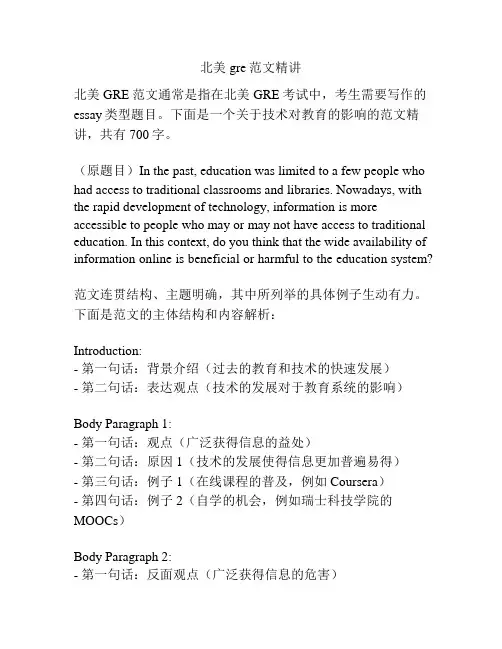
北美gre范文精讲北美GRE范文通常是指在北美GRE考试中,考生需要写作的essay类型题目。
下面是一个关于技术对教育的影响的范文精讲,共有700字。
(原题目)In the past, education was limited to a few people who had access to traditional classrooms and libraries. Nowadays, with the rapid development of technology, information is more accessible to people who may or may not have access to traditional education. In this context, do you think that the wide availability of information online is beneficial or harmful to the education system?范文连贯结构、主题明确,其中所列举的具体例子生动有力。
下面是范文的主体结构和内容解析:Introduction:- 第一句话:背景介绍(过去的教育和技术的快速发展)- 第二句话:表达观点(技术的发展对于教育系统的影响)Body Paragraph 1:- 第一句话:观点(广泛获得信息的益处)- 第二句话:原因1(技术的发展使得信息更加普遍易得)- 第三句话:例子1(在线课程的普及,例如Coursera)- 第四句话:例子2(自学的机会,例如瑞士科技学院的MOOCs)Body Paragraph 2:- 第一句话:反面观点(广泛获得信息的危害)- 第二句话:原因1(信息的过度获取可能导致信息混乱)- 第三句话:例子1(谣言和不准确信息的传播)- 第四句话:例子2(内容过载的问题)Conclusion:- 第一句话:总结两个观点及原因- 第二句话:再次强调观点- 第三句话:表达偏向性观点并得出结论范文结构与内容的描述如下:Introduction:In the past, education was limited to a few people who had access to traditional classrooms and libraries. Nowadays, with the rapid development of technology, information is more accessible to people who may or may not have access to traditional education. In this context, the wide availability of information online has brought significant changes to the education system.Body Paragraph 1:One advantage of the wide availability of information online is that it allows individuals to access a wide range of educational resources. With the development of technology, information is no longer confined to physical spaces such as classrooms and libraries. Online platforms like Coursera have made it possible for anyone with an internet connection to enroll in courses taught by top professors from around the world. Additionally, institutions like ETH Zurich offer Massive Open Online Courses (MOOCs) that allow individuals to learn valuable skills in a self-paced manner.These opportunities for self-directed learning have greatly expanded access to education.Body Paragraph 2:However, the wide availability of information online also poses challenges to the education system. The ease of access to information can lead to information overload, making it difficult for individuals to distinguish between reliable sources and unreliable ones. The rapid spread of rumors and misinformation on social media platforms is a prime example of how easily false information can be disseminated. Moreover, the excessive exposure to information can be overwhelming and may hinder effective learning, as individuals may struggle to prioritize and process the vast amount of information available to them. Conclusion:In conclusion, the wide availability of information online has both benefits and drawbacks for the education system. On one hand, it has democratized access to educational resources and provides opportunities for self-directed learning. On the other hand, it has brought challenges such as information overload and the spread of unreliable information. Overall, it is important for individuals to develop critical thinking skills and information literacy in order to navigate the vast amount of information available online.。
——参考范本——【资格考试】2019最新整理-GRE写作范文及领悟______年______月______日____________________部门休息了几天,对GRE作文本人领悟了一些东西。
人家说到底也是考“ANALYTICAL writing”,分析还是在第一位的,我们的态度因此不要太偏了(有时候),只是想到作文,这个“作文”是有条件的——分析性写作。
所以,不一定非得想尽办法紧扣题目。
人家写了一个claim以后,想溯源的说起因,想结果的去推断,想就着这个claim来论证的也可以分方面分程度,定性结合定量。
死扣一个很容易没话说(关键词:原因,结果,方面,程度,定性,定量)。
我还觉得自己可以界定一下范围。
今天晚上写完了issue74之后才想起来,人家说的是most,完全可以交代一下,说most涉及的东西太多了,无法说清楚,但是就within language&image而言,的确是image更好(我的position)。
这样也可以避免绝对化。
只要人家看出来你会,而且很好的进行逻辑分析,就okay了。
同时想完了后,看了一看pp3里边的一些说明,正好不谋而合。
下面是根据GRE写作考试Issue74写了一篇范文,大家可以从中得到一点启发。
[Issue74]“The most effective way to communicate anidea or value to large groups of people is through the use of images, not language.”[参考范文]I strongly agree with the author on the claim that image generally serves to be a better means of communication than language, and this is no exception whenthe audience is a large group. Though everyday we speak oneor several languages to express ourselves, theAchilles‘ heel of language makes it incompetent in certain critical case.That Achilles‘heel is “misinterpretation”, a characteristic of language,particularly conspicuous when it comes to multi-language situations. Among countless misunderstandings in this way ever since people begin to speak, one heartbreaking tragedy can effectively supportthis claim. The story begins with one American boy who fellin love with a Japanese girl, but neither expressed their feeling for each other at that moment. One day when the boy was to leave the girl for a period of time,he left her anote with the word “shine” on it. The word “shine”,initially indicating her shining beauty as the boy later said,shocked the Japanese girl when she see it, and so despairedat the note that she committed suicide three days later. The reason, later discovered,is that the girl with poor English interpreted the word as “shi-ne”,which is “go hell” or “die” in Japanese. In the case nobody can deny the crime of language,since the young girl would not have perished wereit not for this grievous misinterpretation. Therefore we see the harmful, in this case fatal, consequence that may be brought about by the Achilles’ heel of language.。
研习GRE作文考试的优秀范文参考研习GRE作文考试的优秀范文不仅可以学到有用的词汇和句子,更能从中学习逻辑的构建方式和作文框架的构造等内容,这里为大家提供GRE的范文,希望对同学们的备考有所帮助。
Icebergs are among nature s most spectacular creations, and yet most people have never seen one. A vague air of mystery envelops them. They e into being ----- somewhere ------in faraway, frigid waters, amid thunderous noise and splashing turbulence, which in most cases no one hears or sees. They exist only a short time and then slowly waste away just as unnoticed.Objects of sheerest beauty they have been called. Appearing in an endless variety of shapes, they may be dazzlingly white, or they may be glassy blue, green or purple, tinted faintly of in darker hues. They are graceful, stately, inspiring ----- in calm, sunlight seas.But they are also called frightening and dangerous, and that they are ---- in the night, in the fog, and in storms. Even in clear weather one is wise to stay a safe distance away from them. Most of their bulk is hidden below the water, so their underwater parts may extend out far beyond the visible top. Also, they may roll over unexpectedly, churning the waters around them.Icebergs are parts of glaciers that break off, driftinto the water, float about awhile, and finally melt.Icebergs afloat today are made of snowflakes that have fallen over long ages of time. They embody snows that drifted down hundreds, or many thousands, or in some cases maybe a million years ago. The snows fell in polar regions and on cold mountains, where they melted only a little or not at all, and so collected to great depths over the years and centuries.。
h
h
GRE作文北美范文 实践是成功的唯一途径
4月份GRE考试已结束,同学们需进入下轮GRE备考中,备考GRE首先要选择好的资料,GRE北美范文对备考GRE写作有一定的
指导作用,下面为大家整理了最完整版的GRE北美范文,主要是关于GRE ISSUE作文范文,供大家应用。
"In any realm of life---whether academic, social, business, or political---the only way to succeed is to take
a practical, rather than an idealistic, point of view. Pragmatic behavior guarantees survival, whereas idealistic
views tend to be superceded by simpler, more immediate options."
I agree with the speaker insofar as that a practical, pragmatic approach toward our endeavors can help us survive
in the short tenn. However, idealism is just as crucial if not more so--for long-term success in any endeavor, whether
it be in academics, business, or political and social reform.
When it comes to academics, students who we would consider pragmatic tend not to pursue an education for its
own sake. Instead, they tend to cut whatever corners are needed to optimize their grade average and survive the
current academic term. But, is this approach the only way to succeed academically? Certainly not. Students who eamesdy
pursue intellectual paths that truly interest them are more likely to come away with a meaningful and lasting education.
In fact, a sense of mission about one's area of fascination is strong motivation to participate actively in class
and to study earnesdy, both of which contribute to better grades in that area. Thus, although the idealist-student
might sacrifice a high overall grade average, the depth of knowledge, academic discipline, and sense of purpose
the student gains will serve that student well later in life.
In considering the business world it might be more tempting to agree with the speaker; after all, isn't business
fundamentally about pragmatism--that is, "getting the job done" and paying attention to the "bottom line"?
Emphatically, no. Admittedly, the everyday machinations of business are very much about meeting mundane short-term
goals: deadlines for production, sales quotas, profit margins, and so forth. Yet underpinning these activities is
the vision of the company's chief executive--a vision which might extend far beyond mere profit maximization to
the ways in which the frrm can make a lasting and meaningful contribution to the community, to the broader economy,
and to the society as a whole. Without a dream or vision--that is, without strong idealist leadership--a firm can
easily be cast about in the sea of commerce without dear direction, threatening not only the fLrm's bottom line
but also its very survival.
Finally, when it comes to the political arena, again at fzrst blush it might appear that pragmatism is the best,
if not the only, way to succeed. Most politicians seem driven by their interest in being elected and reelected--that
is, in surviving--rather than by any sense of mission, or even obligation to their constituency or country. Diplomatic
and legal maneuverings and negotiations often appear intended to meet the practical needs of the parties
involved--minimizing costs, preserving options, and so forth. But, it is idealists-not pragmatists--who sway the
masses, incite revolutions, and make political ideology reality. Consider idealists such as America's founders,
Mahatma Gandhi, or Martin Luther IGng. Had these idealists concerned themselves with short-term survival and immediate
needs rather than with their notions of an ideal society, the United States and India might still be British colonies,
and African-Americans might still be relegated to the backs of buses.
h
h
In short, the statement fails to recognize that idealism--keeping one's eye on an ultimate prize--is the surest
path to long-term success in any endeavor. Meeting one's immediate needs, while arguably necessary for short-term
survival, accomplishes litde without a sense of mission, a vision, or a dream for the long term.
欢迎您的下载,资料仅供参考!